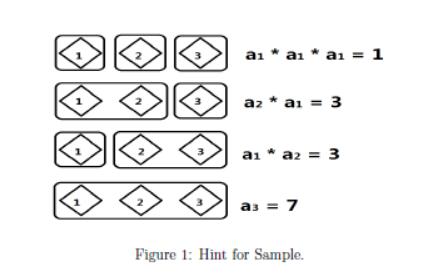hdu 5730 Shell Necklace
2017-06-28 18:40
369 查看
Shell Necklace
Time Limit: 16000/8000 MS (Java/Others) Memory Limit: 65536/65536 K (Java/Others)Total Submission(s): 1110 Accepted Submission(s): 471
Problem Description
Perhaps the sea‘s definition of a shell is the pearl. However, in my view, a shell necklace with n beautiful shells contains the most sincere feeling for my best lover Arrietty, but even that is not enough.
Suppose the shell necklace is a sequence of shells (not a chain end to end). Considering i continuous shells in the shell necklace, I know that there exist different schemes to decorate the i shells together with one declaration of love.
I want to decorate all the shells with some declarations of love and decorate each shell just one time. As a problem, I want to know the total number of schemes.
Input
There are multiple test cases(no more than 20 cases
and no more than 1 in extreme case), ended by 0.
For each test cases, the first line contains an integer n,
meaning the number of shells in this shell necklace, where 1≤n≤105.
Following line is a sequence with nnon-negative
integer a1,a2,…,an,
and ai≤107 meaning
the number of schemes to decorate i continuous
shells together with a declaration of love.
Output
For each test case, print one line containing the total number of schemes module 313(Three
hundred and thirteen implies the march 13th, a special and purposeful day).
Sample Input
3
1 3 7
4
2 2 2 2
0
Sample Output
14
54
Hint

For the first test case in Sample Input, the Figure 1 provides all schemes about it. The total number of schemes is 1 + 3 + 3 + 7 = 14.
Author
HIT
Source
2016 Multi-University Training Contest 1
【分析】
分治FFT
dp[i]=Σdp[j]*a[i-j]
如果朴素转移需要O(n^2)
考虑分治
发现是一个卷积的形式
处理出来[l,mid]里的dp值后做卷积,统计[l,mid]对[mid+1,r]的贡献。
复杂度O(n log^2 n)
还卡空间2333
【代码】
//hdu 5730 Shell Necklace
#include<bits/stdc++.h>
#define pi acos(-1)
#define ll long long
#define M(a) memset(a,0,sizeof a)
#define fo(i,j,k) for(int i=j;i<=k;i++)
using namespace std;
const int mxn=333333;
const int mod=313;
int N,L,n,m;
int aaa[mxn];
int R[21][mxn];
int dp[mxn];
struct E
{
double r,f;
E (double _r,double _f) {r=_r,f=_f;}
E () {}
E operator + (E u) {return E(r+u.r,f+u.f);}
E operator - (E u) {return E(r-u.r,f-u.f);}
E operator * (E u) {return E(r*u.r-f*u.f,r*u.f+f*u.r);}
E operator / (int u) {return E(r/u,f/u);}
}a[400005],b[400005],c[400005];
inline void FFT(E *a,int f)
{
fo(i,0,n-1) if(i<R[L][i]) swap(a[i],a[R[L][i]]);
for(int i=1;i<n;i<<=1)
{
E wn(cos(pi/i),f*sin(pi/i));
for(int j=0;j<n;j+=(i<<1))
{
E w(1,0);
for(int k=0;k<i;k++,w=w*wn)
{
E x=a[j+k],y=w*a[j+k+i];
a[j+k]=x+y,a[j+k+i]=x-y;
}
}
}
if(f==-1) fo(i,0,n-1) a[i]=a[i]/n;
}
inline void Dirich(E *a,E *b)
{
m=n+n;L=0;
for(n=1;n<=m;n<<=1) L++;
FFT(a,1),FFT(b,1);
fo(i,0,n) a[i]=a[i]*b[i];
FFT(a,-1);
}
inline void CDQ(int l,int r)
{
if(l==r)
{
dp[l]=(dp[l]+aaa[l])%mod;
return;
}
int mid=l+r>>1;
CDQ(l,mid);
n=r-l;
fo(i,0,4*n) a[i]=b[i]=E(0,0);
fo(i,l,mid) a[i-l].r=dp[i];
fo(i,0,r-l) b[i].r=aaa[i];
Dirich(a,b);
fo(i,mid+1,r) dp[i]=(dp[i]+(ll)(a[i-l].r+0.5)%mod)%mod;
CDQ(mid+1,r);
}
int main()
{
fo(k,1,20) fo(i,0,mxn-1)
R[k][i]=(R[k][i>>1]>>1)|((i&1)<<(k-1));
while(scanf("%d",&N) && N)
{
fo(i,1,N) scanf("%d",&aaa[i]);
fo(i,1,N) aaa[i]%=mod;
memset(dp,0,sizeof dp);
CDQ(1,N);
printf("%d\n",(dp
+mod)%mod);
}
return 0;
}
/*
3
1 3 7
4
2 2 2 2
0
*/
相关文章推荐
- HDU 5730 Shell Necklace(dp+cdq分治+FFT优化)
- hdu 5730 Shell Necklace(2016多校第一场)FFT+分治
- hdu 5730 Shell Necklace [分治fft | 多项式求逆]
- [HDU 5730] Shell Necklace (FFT+CDQ分治)
- 【HDU 5730】Shell Necklace
- hdu 5730 2016 Multi-University Training Contest 1 Shell Necklace 解题报告
- HDU 5730 Shell Necklace(FFT+分治)
- HDU 5730: Shell Necklace 分治FFT
- HDU 5730 多校1 Shell Necklace (CDQ分治+FFT)
- HDU 5730 Shell Necklace(CDQ分治+FFT)
- Hdu 5730 Shell Necklace(cdq+fft)
- HDU 5730 Shell Necklace(CDQ分治+FFT)
- HDU 5730 Shell Necklace cdq分治+FFT
- HDU - 5730 Shell Necklace CDQ分治+fft
- HDU 3874 Necklace 树状数组的应用
- HDU-3874 Necklace 树状数组+离线处理
- 【HDU】3474 Necklace
- hdu 3333 Turing Tree & hdu 3874 Necklace (成段更新)
- hdu 2660 Accepted Necklace
- HDU 3474 Necklace
